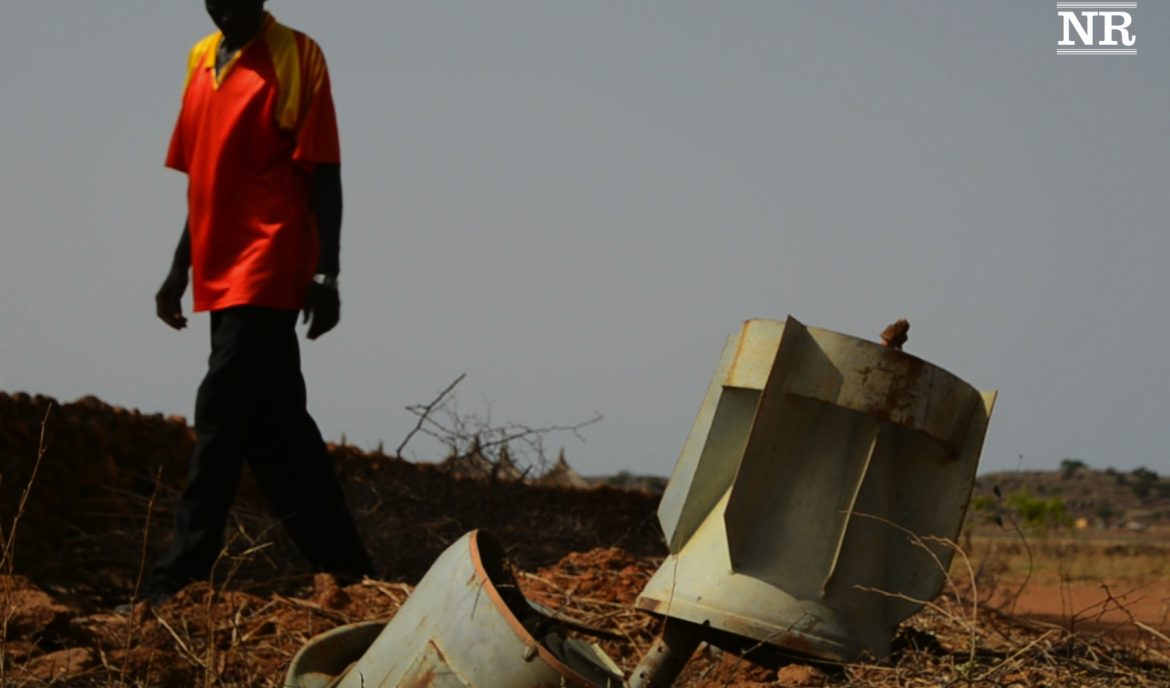“We don’t know where it came from, it just came from nowhere and surprised us”
On March 15, four MiG fighter planes and two Antonov planes dropped bombs over Angolo village, injuring seven women and several children, according to civilians in the region.
Each MiG dropped two large bombs, and the Antonov planes together dropped an estimated 15 bombs, according to Dawood Raas Amoun, an Angolo local. Small Arms Survey with the help of Eyes and Ears Nuba has since identified two unexploded bombs as Russian-made cluster bombs. Eyes and Ears Nuba reporters have found two additional unexploded cluster bombs in Ghiniah, a village in Buram County. Sudan government officials have stated on several occasions, most recently on April 19, that Sudan does not possess nor produce cluster munitions, nor ever used cluster munitions.
The bombs only caused injuries to civilians, Amoun said, as no rebel forces were in the area. Since fighting erupted, officials in Southern Kordofan estimate that 6,000 bombs have been dropped by the Sudan Armed Forces (SAF).
“The government hunts and seizes the escaping people,” Amoun said, and explained that civilians who escape to areas controlled by the SAF will be forcibly recruited to the national army and ordered to fight against their own communities. “To the people who went from here and sent back aircrafts to kill their own mothers, sons and brothers, my message to them,” he said, “we as citizens in this land, we are still standing, we are still faithful to our cause and rights.”
The past few months the SAF has failed in several attempts to control Buram County, which is currently occupied by the Sudan Peoples Liberation Movement-North (SPLM-N).
Three types of aircraft bombers have been used in attacks against Buram County: Antonovs, MiGs, Helicopter Gunships, and Weishi, according to the commissioner of Buram County, Ahmed Teia Kafi. Three days ago, the first rocket fell near the county building, Kafi said, and the other crossed to a region of Tabanya.
Eyes and Ears Nuba has contributed to the identification of Weishi, 302-millimeter Chinese-manufactured rockets. The SAF has launched more than 80 Weishi in Southern Kordofan. These rockets can be launched from more than 100 kilometers away.
The attacks come without warning, according to civilians in the Nuba Mountains. Seventy-year-old Layla Jamal showed our reporters the impact site of a Weishi, which exploded 200 meters from her home.
“We don’t know where it came from, it just came from nowhere and surprised us,” Jamal said. “We ran away and laid down and God was the one to protect us.”
Ahmed Teia Kafi, the commissioner of Buram County, said he is concerned about two unexploded bombs in Angolo.
“I fear that some kids might play with it and make it explode,” Kafi said of one bomb, which sits in a highly-populated area in Angolo. “We must get a method to manipulate it.”
In Tess village, he said, three homes were destroyed in one day by one aerial bomber. The owner of one home, he said, was cut into pieces.
“The National Congress Party is intentionally targeting civilians,” Kafi said, “so they can be terrorized to run from here and join their militias. This is the core goal, to terrorize the civilians, because the civilian is simple. When he sees the bombarding, he thinks this is the end.”
He estimated that 100 civilians in his county have been injured by aerial bombs and rockets.
“Some of them have lost their legs and others their hands,” he said.
Kafi cited the case of an eleven-year-old boy who was tending his cows. An Antonov dropped bombs over them, immediately killing the boy and his livestock. The SAF has been targeting livestock and fields in order to starve the people, Kafi explained.
“We are in the threshold of rainy season,” he said. “If no food arrives, it means humanitarian catastrophe.”
The United Nations and human rights organizations evacuated their workers last June when fighting erupted. Kafi said he believes they must immediately intervene to rescue the people of the Nuba Mountains. Change, he added, must also come from within Sudan.
“I call upon the Sudanese people in general,” he said, “and particularly the people of Southern Kordofan, Blue Nile, and Darfur to uproot the National Congress Party from power, so Sudan can enjoy stability like the rest of the world.”
Eyes and Ears Nuba asked Jamal what she would say to the president of Sudan, Omar al-Bashir.
“What can I say?” she replied. “He wants power, but he is using this weapon to threaten the civilians. We thought the civilians are the ones to put him in power.”





